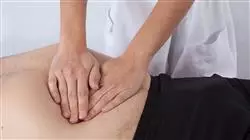University certificate
Scientific endorser

The world's largest faculty of physiotherapy”
Introduction to the Program
Become an expert in Muscular and Metabolic Physiology in a few months and without leaving home"

One of the most relevant and basic aspects of sports nutrition is muscle physiology and biochemistry, which is responsible for regulating the entire metabolic process resulting from physical exercise. That is why professionals with specific and advanced knowledge in this essential subject for Physiotherapy and Nutrition are increasingly in demand.
This is the reason why TECH has designed a Postgraduate diploma in Muscular and Metabolic Physiology with which it seeks to provide students with innovative knowledge and practical skills with which to perform their work with the highest quality and knowing how to deal with any situation they encounter in the workplace. And this, through a syllabus that addresses topics such as nutrition for athletes, the biochemical assessment of the athlete or the mixed bioenergetics of muscle fibers.
All this, in a 100% online mode that allows students to study and combine this activity with their other obligations, without the need to be subject to strict schedules. In addition, with the total availability of a complete theoretical and practical content, updated and that represent a unique opportunity in the academic market.
It delves into areas such as nutritional planning and energy requirements at different times of the season, without leaving home and at any time of the day"
The Postgraduate diploma in Muscular and Metabolic Physiology contains the most complete and up-to-date Scientific program on the market. Its most outstanding features are:
- The development of case studies presented by experts in Muscle Physiology and Metabolism
- The graphic, schematic, and practical contents with which they are created, provide scientific and practical information on the disciplines that are essential for professional practice
- Practical exercises where self-assessment can be used to improve learning
- Its special emphasis on innovative methodologies
- Theoretical lessons, questions to the expert, debate forums on controversial topics, and individual reflection assignments
- Content that is accessible from any fixed or portable device with an Internet connection
Stand out in a booming sector that will significantly enhance your professional profile in the field of Sports Nutrition"
The program includes in its teaching staff professionals from the sector who bring to this program the experience of their work, as well as recognized specialists from leading societies and prestigious universities.
The multimedia content, developed with the latest educational technology, will provide the professional with situated and contextual learning, i.e., a simulated environment that will provide immersive education programmed to learn in real situations.
This program is designed around Problem-Based Learning, whereby the professional must try to solve the different professional practice situations that arise during the academic year For this purpose, the students will be assisted by an innovative interactive video system created by renowned and experienced experts.
Acquire new knowledge on body composition for athletes, thanks to TECH"

Access all the content on muscle structure and muscle fiber types, from any device with Internet connection"
Why study at TECH?
TECH is the world’s largest online university. With an impressive catalog of more than 14,000 university programs available in 11 languages, it is positioned as a leader in employability, with a 99% job placement rate. In addition, it relies on an enormous faculty of more than 6,000 professors of the highest international renown.

Study at the world's largest online university and guarantee your professional success. The future starts at TECH”
The world’s best online university according to FORBES
The prestigious Forbes magazine, specialized in business and finance, has highlighted TECH as “the world's best online university” This is what they have recently stated in an article in their digital edition in which they echo the success story of this institution, “thanks to the academic offer it provides, the selection of its teaching staff, and an innovative learning method aimed at educating the professionals of the future”
A revolutionary study method, a cutting-edge faculty and a practical focus: the key to TECH's success.
The most complete study plans on the university scene
TECH offers the most complete study plans on the university scene, with syllabuses that cover fundamental concepts and, at the same time, the main scientific advances in their specific scientific areas. In addition, these programs are continuously being updated to guarantee students the academic vanguard and the most in-demand professional skills. In this way, the university's qualifications provide its graduates with a significant advantage to propel their careers to success.
TECH offers the most comprehensive and intensive study plans on the current university scene.
A world-class teaching staff
TECH's teaching staff is made up of more than 6,000 professors with the highest international recognition. Professors, researchers and top executives of multinational companies, including Isaiah Covington, performance coach of the Boston Celtics; Magda Romanska, principal investigator at Harvard MetaLAB; Ignacio Wistumba, chairman of the department of translational molecular pathology at MD Anderson Cancer Center; and D.W. Pine, creative director of TIME magazine, among others.
Internationally renowned experts, specialized in different branches of Health, Technology, Communication and Business, form part of the TECH faculty.
A unique learning method
TECH is the first university to use Relearning in all its programs. It is the best online learning methodology, accredited with international teaching quality certifications, provided by prestigious educational agencies. In addition, this disruptive educational model is complemented with the “Case Method”, thereby setting up a unique online teaching strategy. Innovative teaching resources are also implemented, including detailed videos, infographics and interactive summaries.
TECH combines Relearning and the Case Method in all its university programs to guarantee excellent theoretical and practical learning, studying whenever and wherever you want.
The world's largest online university
TECH is the world’s largest online university. We are the largest educational institution, with the best and widest online educational catalog, one hundred percent online and covering the vast majority of areas of knowledge. We offer a large selection of our own degrees and accredited online undergraduate and postgraduate degrees. In total, more than 14,000 university degrees, in eleven different languages, make us the largest educational largest in the world.
TECH has the world's most extensive catalog of academic and official programs, available in more than 11 languages.
Google Premier Partner
The American technology giant has awarded TECH the Google Google Premier Partner badge. This award, which is only available to 3% of the world's companies, highlights the efficient, flexible and tailored experience that this university provides to students. The recognition as a Google Premier Partner not only accredits the maximum rigor, performance and investment in TECH's digital infrastructures, but also places this university as one of the world's leading technology companies.
Google has positioned TECH in the top 3% of the world's most important technology companies by awarding it its Google Premier Partner badge.
The official online university of the NBA
TECH is the official online university of the NBA. Thanks to our agreement with the biggest league in basketball, we offer our students exclusive university programs, as well as a wide variety of educational resources focused on the business of the league and other areas of the sports industry. Each program is made up of a uniquely designed syllabus and features exceptional guest hosts: professionals with a distinguished sports background who will offer their expertise on the most relevant topics.
TECH has been selected by the NBA, the world's top basketball league, as its official online university.
The top-rated university by its students
Students have positioned TECH as the world's top-rated university on the main review websites, with a highest rating of 4.9 out of 5, obtained from more than 1,000 reviews. These results consolidate TECH as the benchmark university institution at an international level, reflecting the excellence and positive impact of its educational model.” reflecting the excellence and positive impact of its educational model.”
TECH is the world’s top-rated university by its students.
Leaders in employability
TECH has managed to become the leading university in employability. 99% of its students obtain jobs in the academic field they have studied, within one year of completing any of the university's programs. A similar number achieve immediate career enhancement. All this thanks to a study methodology that bases its effectiveness on the acquisition of practical skills, which are absolutely necessary for professional development.
99% of TECH graduates find a job within a year of completing their studies.
Postgraduate Diploma in Muscular and Metabolic Physiology
Muscular and metabolic physiology plays a fundamental role in the practice of physical therapy. As a health care professional, it is important to understand the physiological processes occurring in the human body, especially as they relate to the muscular and metabolic system. The Postgraduate Diploma in Muscular and Metabolic Physiology for Physiotherapists from TECH Global University gives you the opportunity to gain in-depth knowledge in this area and enhance your clinical skills. This online program is designed specifically for physiotherapists who wish to expand their understanding of muscle and metabolic physiology, and how these systems are related to the evaluation and treatment of musculoskeletal conditions. The Postgraduate Diploma in Muscle and Metabolic Physiology for Physiotherapists will provide you with a solid foundation in musculoskeletal anatomy and physiology, as well as the biochemical and metabolic aspects of muscle tissue. You will learn about the different forms of muscle contraction, the energetic processes that underpin muscle activity, and muscle adaptations in response to training and rehabilitation. You will also explore the relationship between muscle and metabolic physiology and various musculoskeletal conditions, such as sports injuries, chronic pain and neuromuscular diseases. You will learn how to assess and design specific treatment plans, taking into account the underlying physiological processes and the individual needs of each patient.You will learn how to assess and design specific treatment plans, taking into account the underlying physiological processes and individual needs of each patient.
Become a specialist in the Health Sector with TECH
The program is developed in an online learning environment, allowing you to study flexibly and adapt your schedule to your needs. You will have access to up-to-date study materials, interactive resources and clinical cases that will help you apply your knowledge in real situations.In addition, you will have the support of expert professors in muscle and metabolic physiology, who will provide guidance and answer your questions. You will also have the opportunity to interact with other physiotherapists and health professionals, sharing experiences and expanding your network. Upon completion, you will be prepared to apply knowledge of physiology in clinical practice, enhancing your skills in the assessment and treatment of musculoskeletal conditions.







